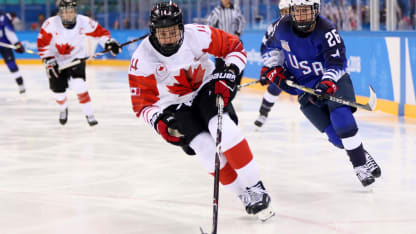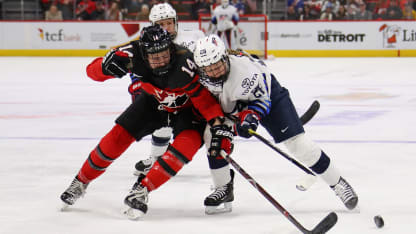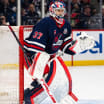NHL.com's Q&A feature called "Five Questions With …" runs every Tuesday. We talk to key figures in the game and ask them questions to gain insight into their lives, careers and the latest news.
The latest edition features Toronto Furies defenseman and Canada women's national team member Renata Fast.
Five Questions with Renata Fast
Defenseman, Olympian on growth of women's hockey, how to increase exposure

© Jamie Squire/Getty Images
By
Mike Zeisberger
NHL.com Staff Writer
SAN JOSE -- Renata Fast is at the vanguard of the next generation of elite players in the women's game.
The 24-year-old defenseman is on the initial roster to represent Canada at the 2019 Women's World Championship, which begins in Espoo, Finland on April 4. She also represented Canada in the 2018 PyeongChang Olympics, winning a silver medal.
She was also a member of the Clarkson Golden Knights team that won the 2014 National Collegiate women's ice hockey championship title.
Domestically, she plays for the Toronto Furies in the Canadian Women's Hockey League. The Furies were eliminated in the playoffs by the Calgary Inferno, who went on to win the Clarkson Cup with a championship-game victory against the Montreal Canadiennes on Sunday.
To celebrate Gender Equality Month, NHL.com caught up with Fast at the 2019 Honda NHL All-Star Game, where she talked about the impact of women being part of Honda NHL All-Star Weekend. Standing on the bench behind Los Angeles Kings defenseman Drew Doughty and Edmonton Oilers center Connor McDavid, Fast knew she was part of a pioneering experience that would change women's hockey forever.
Fast, fellow Canada Olympian Rebecca Johnson and United States Olympic team members Kendall Coyne Schofield and Brianna Decker were there to demonstrate events at the 2019 SAP NHL All-Star Skills at SAP Center in San Jose on Jan. 26.
With Colorado Avalanche forward Nathan MacKinnon dropping out of the Bridgestone NHL Fastest Skater because of an injury, Coyne Schofield was inserted to replace him.
The result was a moment Fast said will have a huge impact on the women's game. In her opinion, it already has.
"I was down at ice level with a bunch of the guys and as soon as Kendall took off the first three strides, you could feel the vibe on the bench," she said. "As soon as she took that first lap circling that first net, they all stood on the benches because they were so intrigued and super intense. Not in a derogatory way at all, they were just excited to see it and they started to appreciate our game more."
With the crowd roaring its approval, Coyne Schofield finished with a time of 14.346, less than a second off McDavid's winning time of 13.378.
"I think that's a huge boost, the fact that the NHL put her right into the competition and the way she succeeded the way she did," Fast said. "Young girls can now look at her, at all of the four of us that were there and understand just how good our game is."
The quality of the women's game was also on display at the 2018 PyeongChang Olympics, when Canada lost the gold-medal game to the United States in a shootout.
"The highest of highs in my career was being chosen for the Olympic team," Fast said. "The lowest of the lows was losing that game -- and the way we lost.
"But win or lose, we've helped open eyes to the women's game. That's important."
Here are Five Questions with … Renata Fast:
If you were elected president of the women's pro game worldwide, what would be the first thing you would change?
"I think the No. 1 thing we need to do is that right now we have two professional leagues for women's hockey, the Canadian Women's Hockey League and the National Women's Hockey League. We need to find a way to have one league, so we can get all the top talent together. Best-on-best every night so there's no confusion for the fans between the leagues. There's not as much exposure as we'd like for our sport and to have two leagues just creates confusion. If we can get one league, it would be easier to brand our product and maybe get support from the NHL. I think that's a great starting point because then the young girls have a chance to better know where to find role models and learn from them.
The Olympics is a great time to showcase women's hockey, but we need a way between them to keep the awareness of the sport, specifically the club teams from where all these women's Olympic players come from. Having one league instead of two would go a long way toward helping that."

© Gregory Shamus/Getty Images
You had the chance to rub shoulders with former NHL players Curtis Joseph and Doug Gilmour, and comedian Gerry Dee, who were honorary coaches for the CWHL All-Star Game at Scotiabank Arena in Toronto on Jan. 20. What was that like?
"It was funny. Gerry, Cujo, Doug, they all supported us. Celebrity coaches who all supported the women's game. It was especially special because they all wanted to be there. It was really big for our sport. It was great to interact with them. I know Cujo was telling us about some of his experiences with the NHL, even giving us inspirational tips. That was so cool. But the best part was, they took us seriously. They looked at us as fellow hockey players. They didn't try to belittle us because of gender. The exact opposite, actually. And with thousands of people in the stands watching us, it was great."
What impact did the inclusion of four women at the All-Star Game experience have on the female sport long-term?
"I think it shuts up the people who think our game is slow and not powerful. Our game -- the women's and men's -- aren't the same, but it shows the quality of the game. Even the guys at the All-Star Game were excited. Honestly that was amazing not just for hockey but for sports in general. It should go to show that our game is fast as well."
You talk about that evening in San Jose as a springboard for young female hockey players to be inspired, to be motivated, to be driven to keep playing the game they love. To what extent?
"The NHL is a great place for everyone to watch hockey. For young girls, they might say, 'I want to play in the NHL one day.' Then they get older and realize it's not an option. I think that's why some girls might drop out of the sport. But to see women included in an event like the All-Star Game activities, it brings our game into the narrative again. When they see Kendall like that, they can dream about one day being in our position. They can see a future and they want to learn about maybe playing in a women's pro league. Maybe we can inspire them. There's a big drop-off in women's participation when girls hit age 13. To have ambassadors for us along with the men in the sport, it's exactly that, it was an inspiration."
Who inspired you as a young girl growing up, given that women's hockey wasn't as much in the limelight then as it is now?
"There definitely were so many trailblazers in the women's game when I was growing up. There wasn't as much media around them, but they were still there. For me, Becky Kellar and Cheryl Pounder -- they both played for Canada at the 2006 (Turin) Olympics -- they had a hockey camp in my hometown of Burlington, Ontario that I went to. You saw how much talent that was there and it was incentive. It was a good way to inspire girls. But now that we were actually represented in an NHL event, I just think it takes the awareness to the next level."

















